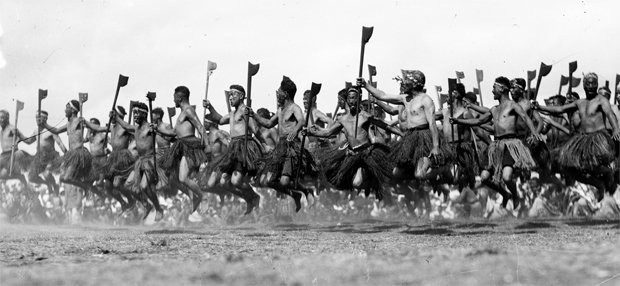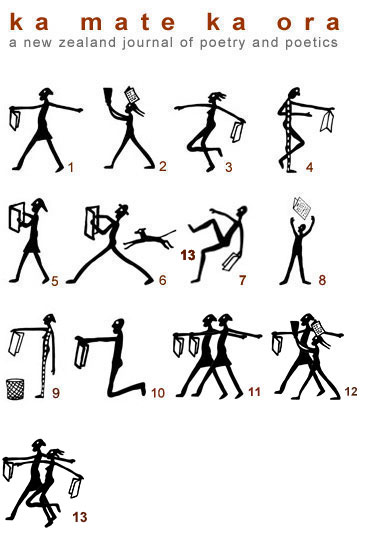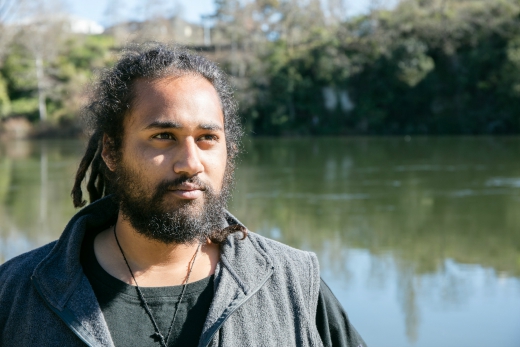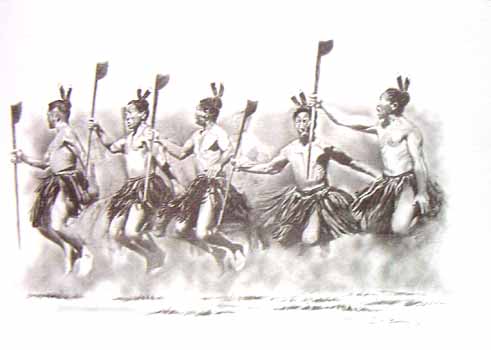Ka Mate Ka Mate Ka Ora Ka Ora
Ka Mate Ka Ora - NZEPC and critical writing #2

Following on from the last post, what then is Ka Mate Ka Ora and where did the title of this free electronic resource come from?
The very first issue was December 2005. To quote from the website introduction, 'The journal is part of the New Zealand Electronic Poetry Centre (nzepc) and is based at the University of Auckland. It will publish substantial essays (6,000 – 10,000 words), review articles, historical reappraisals, close readings, shorter notices and mixed genre criticism in the area of poetry and poetics. We intend to provide a site for discourse and debate about New Zealand poetry. We will not consider contributions of poems for publication nor will we publish short reviews of books of poems. All submissions will be sent to referees for assessment and comment. We welcome contributions from poets, academics, essayists, teachers and students from within New Zealand and overseas. ‘New Zealand’ is interpreted broadly in our journal to include expatriate and immigrant writers. New Zealand is seen as a particular locality, community, context or provocation for poetry, but within this site there is a diversity of poetic activities (the poetry discussed need not be explicitly ‘about’ New Zealand).
Murray Edmond, the CEO of KMKO, himself a leading poet and critic over several years in this country, expounds more fulsomely about why there was/is such a site. 'I had been on the Board of nzepc since its founding by Michele Leggott back at the turn of the century. I was keenly interested in a magazine that would create discourse about poetry in Aotearoa/NZ and so I put my hand up to take on the editorial job when we discussed the idea at a Board meeting. nzepc is located within the University of Auckland, therefore the idea of creating a magazine that would aim to publish critical writing of an in-depth and peer-reviewed kind (as opposed to a magazine publishing new poetry and book reviews) was one that would be appropriate to the university environment. Not everyone in the university was happy about KMKO, but we did manage to wrangle a small initial research grant that enabled us to set up the electronic workings, the design and so on. Brian Flaherty, who is a fine poet himself (one of the editors of the on-line journal Trout) and also in charge of IT at Auckland University Library, was an absolutely crucial part of the KMKO set-up, and continues to be the up-loader and formatter for each issue. After a while the University Library acknowledged Brian’s work on KMKO as part of his job description.' [We have already sighted the mighty Brian, of course, in Commentary #1 as regards NZEPC.]
O.K. All fairly clearcut. But why this title? Ka mate Ka Ora is taken from perhaps Aotearoa-New Zealand's most well-known haka or ngeri (war dance of intimidation) composed by Te Rauparaha (c.1768? – 1849) Nō Ngāti Toa, nō Ngāti Raukawa; he rangatira [a chief - from two Māori tribes]. As here -
Ka mate! ka mate!
Ka ora! ka ora!
Ka mate! ka mate!
Ka ora! ka ora!
Tēnei te tangata pūhuruhuru,
Nāna nei i tiki mai whakawhiti te rā!
Hūpane! Hūpane!
Hūpane! Kaupane!
Whiti te rā!
[I die! I die! I live! I live! I die! I di e! I live! I live! This is the hairy man Who fetched the sun causing it to shine! One upward step! Another upward step! One last upward step! Then step forth! Into the sun that shines!]
Robert Sullivan, in the very first issue, summarised the significance of this haka to this 'electronic only' magazine,'In the future, whenever I read this new nzepc journal Ka Mate Ka Ora I will think of the many voices and bodies that have performed Te Rauparaha’s haka, and marvel that “Ka mate, ka mate” is one of the best-recognized New Zealand poems anywhere. I will also think of the stark cultural, ethnic and personal resonances of death and life.' His piece is titled Ka Mate Ka Ora I Live I Die [By the way, Robert Sullivan will be involved later in this series of Commentaries.]
Lisa Samuels, also a poet and scholar of note, further amplifies about the genesis and target audience of Ka Mate Ka Ora - '[It] came into being because Murray saw – correctly, in my view – a need and a wish for a journal of critical poetics in Aotearoa/New Zealand. I remember very well one of my first conversations with him, when I visited for the first time in 2005: he told me about this journal plan and we discussed how to translate “ka mate ka ora,” which sounded (to me then) a bit like “to be or not to be”, but of course Murray explained as a simultaneity: tis life tis death. Ka Mate Ka Ora is designed for people who want to read and write reflectively, critically, and responsively about poetry and poetics in Aotearoa/New Zealand, with reachings outward in Oceania and to other parts of the world with which we connect. It is catholic [my stress] in its literary leanings, and its featured work has so far been determined by our ability to call for work and engage multiple points of view here as well as in our region (as with Pam Brown’s retrospective piece in KMKO 13, in 2014). Most of the issues are thematically cohered, for example our Hone Tuwhare tribute issue (#6 in 2008).'

For me, there have not been enough issues of this important resource - for an interested reader there is not enough material, given that what is there, is excellent and stimulating. Thus 'only' 13 issues so far, with some definite delays between drinks, so to speak. What is on site remains somewhat of an entree, perhaps - it certainly stimulates the appetite for more such critical discourse about poetics and poetry in Aotearoa. Again, the kaupapa (subject-matter, abiding philosophy) could be construed as somewhat selective:
Ka Mate Ka Ora: A New Zealand Journal of Poetry and Poetics will present critical writing in a variety of modes. These include:
- - theoretical and analytic essays on individual poets or significant volumes, on schools or movements, on theoretical angles or historical moments.
- - close readings of individual poems or sequences or books.
- There would seem to be a need for a full time custodian and clerk, for it is such a valuable resource, more so because, as Murray points out further, the site functions as a 'bridge' - between the known and the more obscure; the living and the dead. Lisa Samuels once more, 'If we had not only time but also money and specific digital assistance, it would be very good to have up-to-date lists of new developments and available resources for critical poetics study. It would also be good to have a blog, sound files, video links, more advertising of its existence (calls for work, calls to read what’s there) and an internship for some who would thrive in maintaining these sorts of things.' She and Murray are well aware of this need.


Lisa Samuels Murray Edmond
Is there, then, an Aotearoa Poetic, a definable New Zealand poetry? I first enquired of Murray Edmond - 'Being neither a prophet nor a pundit – and, more seriously, not really one who thinks in terms such as “the state of” – I don’t want to pronounce. Leave that for popes and politicians and practical jokers. I enjoy reading a variety of poetry, but certainly not all varieties. I like to read across languages (though mostly that means translation and/or crib). I don’t feel part of a school or movement or member of any literary citadel. Sometimes I live on the plains, sometimes I go to the mountains for the summer, but the sea can be cool too at such times. I also like to read across eras (poetry has a long historical trace, almost as old as account books, in terms of written language). Poetry for me includes popular song, the ragged parody of street doggerel, some kinds of dramatic speech, nursery and nonsense verse, as well as poetry qua poetry within its various normative formulations. Therefore no statement about the state of; the state it’s in seems to be the state it’s meant to be in: that’s a “state meant.” Later, Murray did amend a bit, 'Rather than try and guess which ‘hot young things’ will endure to become ‘precious national treasures,’ an analysis of the work of the recently departed might provide a more telling picture of ‘the state of.’ Look to the dead to see the future!'
Interestingly, Murray has - over the years - written substantially about New Zealand poetry and poetics, and one of his key essays was entitled Then It Was Now Again: New Zealand Poetries and Colonial Histories, from 2000, in which he quite clearly asks, 'What is a New Zealand poem?What might make it belong to an entity called New Zealand poetry? Can we speak of a poetry, or would it be more useful to speak of poetries?'
He then goes on to dismiss the modernist paradigm whereby there is/was an inherent territorality of geographical, cultural and linguistic borders, 'I might, indeed, be better to refer to 'New Zealand poetries' or 'poetry of the New Zealands' rather than 'New Zealand poetry'. Hear hear Murray, I hear you. (As noted in #1 nzepc, Murray's collected papers are compiled, in a book entitled - unsurprisingly - Then It Was Now Again (Atuanui Press, 2014.)
Lisa is rather more prolix here, as she points out, 'The state of the nation for poetry and poetics in Aotearoa/New Zealand is indeed, as you [Vaughan Rapatahana] note, a big question. I have a 45-page chapbook essay out soon (probably next month) from TinFish Press that treats of part of this question. Its title is Over Hear: six types of poetry experiment in Aotearoa/New Zealand. Its emphasis is on experiments in poetry... I wrote that essay because I was interested, in 2010-2011, in having a look at the situation of and attitudes toward experimental poetry in Aotearoa/New Zealand. The situation for poetry experiments might be stronger now than it was when I arrived in 2006: many young people are rising up and organizing publications and online presence for poetry experiments. Or it may be that my eyes and ears are more open and attuned.
Still, the most visible poetry print culture here has a familiar look: sanctioned normative expressive work is very much dominant in the books one sees in bookstores and advertised and reviewed in literary journals. It’s the same in other English-language-dominant Anglo-American-Australasian cultures. But then, why shouldn’t that be so? It isn’t exactly news that experimenters in any genre in any time are precisely not doing the dominant culture modes of their genre and time. And anyway I see I am writing at the moment from the point of view of my principal interests. For me, poetry is experimentation with language, and I am most interested in imagining what we don’t know, in changing our minds and giving maximal permission to languages.
So another way to consider your question is to point out that things with poetry are exuberantly healthy here: so many readers! So many publishers! Poets coming out with so many books and getting read and reviewed! In a time when even idealistic bookstores – we have a few in Auckland – are pressed to spotlight a genre called “fiction,” it is nice to see a shelf or two devoted to poetry. It’s funny, because as I’ve argued before, so many people write poetry that it’s surprising to me that poetry is not more featured in these kinds of idealistic bookstores. There is a kind of fenced circle in which people buy fiction because it’s the thing that is most touted. Even comics are declared to have a whole month’s focus (September), while poetry gets the problematic and solo National Poetry Day... Anyway, I’m convinced that if poetry were put under the eyes of the buying public more regularly and prominently, more poetry would be bought and read.'
Then Lisa really hits a (H)homer, 'A more pressing ethical matter for me is the sometimes segregation of Anglo-Euro-“white” poetry from Oceania-“world” poetry. As with arts in other parts of the world, there is sometimes evidence of pressure to stay inside your own identitarian place and to refrain from commenting on or participating in any places outside it. One of the things I really like about KMKO is that we’ve been able to bridge that gap pretty well. I know many historically marginalized people do want anyone outside their identities to refrain from participation or comment. I happen to be one of those who believe there is more lost than gained from maintaining such forms of otherism, even though (perhaps paradoxically) I believe whole-heartedly in the rights of anyone to declare the boundaries of their own need... So this is a very tricky area of thinking and action.'
And Lisa returns triumphantly to the dugout with her final salvo, a blast which is right up into the second tier, so to speak, and which will be a feature of a later Commentary, as will a focus on 'experimental' verse in Godzone (another nickname for this country.) She writes, 'One last thing I would comment on is the pretty healthy state of poetry performance in Aotearoa/New Zealand, from regular readings to spoken-word performances. I have sometimes wondered if the strength of theatre here is one of the reasons for the strength of the performed poetic word. ' Poetry slams, poetry readings, rap runs are all obviously part of what Murray nominated as 'New Zealand poetries' and as such are as much 'part of the scene' as 'established' literary magazines. For me also and as earlier stressed - our's is an oral culture, eh. Remember ngā mōteatea Māori.

The future of Aotearoa poetry? Te Kahu Rolleston, National Poetry Slam Winner, 2015.
Te Kahu and I both figured on the bill at the NZ National Poetry Evening in Hamilton, 28 August, 2015.
LINKS:
Murray Edmond - Six Pack Sound feature on NZEPC - Murray reads some of his fine work.
Lisa Samuels - Lots of great material, including Lisa reading several of her poems.
And it is about space, so I found some time for some poems, first, one from Murray Edmond; second, one from Lisa Samuels, both of whom I thank for their tautoko (support) over the years. Please enjoy...
IN PRAISE OF THE INAUTHENTIC
magnet on the fridge
made in China
two dollar shop job
it says it all
in just a few words
have you ever thought
how many towns
have the same name
how many times
on facebook have you
been heard of
by someone you don't know
it's a simple trick
do a deal or two
exchange a dollar
for a dollar
the best rate
you'll ever get
invest in some
profusion
you won't be losing
because mate
YOU ARE NOT
THE ONLY YOU
your back door
opens on a view
of back doors
facing back at you

DRINK ME
in the small right back small of it
ah in the weight has sentences
tell me
thy glorious lip
on summons
you to an order
cooling your hands on
water can press
the button where
distribution gets arranged
and see the small hands
wrapt around the non-
enlightenment we use
when we compose
the small of your face upturned
to me here with material ah. sentences.
(from Wild Dialectics (Shearsman 2012)
Ngā whakaaro